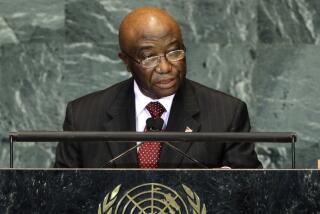President’s Inauguration Marks New Era in Nigeria
- Share via
ABUJA, Nigeria — Retired army Gen. Olusegun Obasanjo was sworn in Saturday as this country’s third elected president in a ceremony that brought to a close more than 15 years of military rule and provided new hope to a nation racked by decades of dictatorship.
Following synchronized marching drills by navy, army and air force guards, a 21-gun salute and a farewell bugle--and in the presence of dozens of foreign dignitaries--outgoing military ruler Gen. Abdulsalami Abubakar, who led the 10-month transition to a civilian regime, handed over the mantle of power.
With this, Africa’s most populous nation breathed a collective sigh of relief.
Obasanjo’s inauguration offers a new chance for this oil-rich West African state, which soldiers have ruled for all but 10 of its 39 years since independence, to build a true democracy, regain its status as an influential powerhouse on the continent and solidify its worldwide respectability.
Vice President Alhaji Abubakar Atiku was also sworn in Saturday amid an atmosphere of excitement and euphoria that enveloped the Eagle Square parade ground in Abuja, the nation’s capital. Even skeptics temporarily put aside doubts about the sincerity of their new leader’s promise to bring about much-awaited change and hungrily savored the moment in the international spotlight.
“As your president of a democratic and civilian administration, I believe this is what God Almighty has ordained for me and my beloved country, Nigeria, and its people,” Obasanjo, 61, said in his inaugural address, which was interrupted by frequent applause. “I accept this destiny in all humility and with the full belief that, with the backing and support of our people, we shall not fail.”
The caliber of international guests at the inauguration, including Britain’s Prince Charles and South African President Nelson Mandela, underscored the growing success of Nigeria’s efforts to put itself back on the international stage.
The nine-member U.S. delegation was headed by Secretary of Transportation Rodney Slater and the Rev. Jesse Jackson, a special presidential envoy for Africa.
Nigerian high society, dressed in shimmering gowns and embroidered caftans, filled the bleachers of the 5,000-seat parade ground, while throngs of other people excitedly lined the roadside, marveling as three Nigerian air force planes flew a farewell display and trying to catch a glimpse of dignitaries as they drove by.
Attired in a traditional white caftan with green trim, the new head of state, who ruled Nigeria as a soldier from 1976 to 1979 before voluntarily relinquishing power, thanked Abubakar for keeping his promise to give power back to civilians.
Obasanjo pledged to make “significant changes within a year,” including ensuring government openness and reversing the trend of corruption that has eroded Nigeria’s economic, social and moral life and earned the country opprobrium overseas.
Telephone, water and electric services are unreliable across much of Nigeria, when they exist at all, and unemployment and ethnic violence plague many parts of this nation of 108 million.
“There will be no sacred cows,” Obasanjo warned. “Nobody . . . will be allowed to get away with a breach of the law or perpetration of corruption and evil.”
A six-month plan will be drawn up to jump-start the reforms, Obasanjo promised, while a law will be passed to allow 13% of revenues from the oil-producing but desperately poor Niger Delta region to be used for rehabilitation of the ecosystem and infrastructure there.
Obasanjo also expressed gratitude to his foreign friends for their support. On Friday, for example, the U.S. Agency for International Development announced plans to expand its development assistance to Nigeria from $13.2 million to $20 million for the next fiscal year.
U.S. officials said Washington will also be sponsoring programs to help professionalize the military and convert the army from a tool of repression to a protector of the people.
Members of Nigeria’s vast diaspora, many of whom fled the country’s military regimes in pursuit of better opportunities abroad, have said they are planning to come home at Obasanjo’s request.
“Being that I have roots here, I feel a great sense of urgency to return to help rebuild the nation,” said Ladun Esan, president of the Atlanta-based Nigerian Business Professional Inc., a group of Nigerian businesspeople that sent eight delegates to the inauguration.
More to Read
Sign up for Essential California
The most important California stories and recommendations in your inbox every morning.
You may occasionally receive promotional content from the Los Angeles Times.











